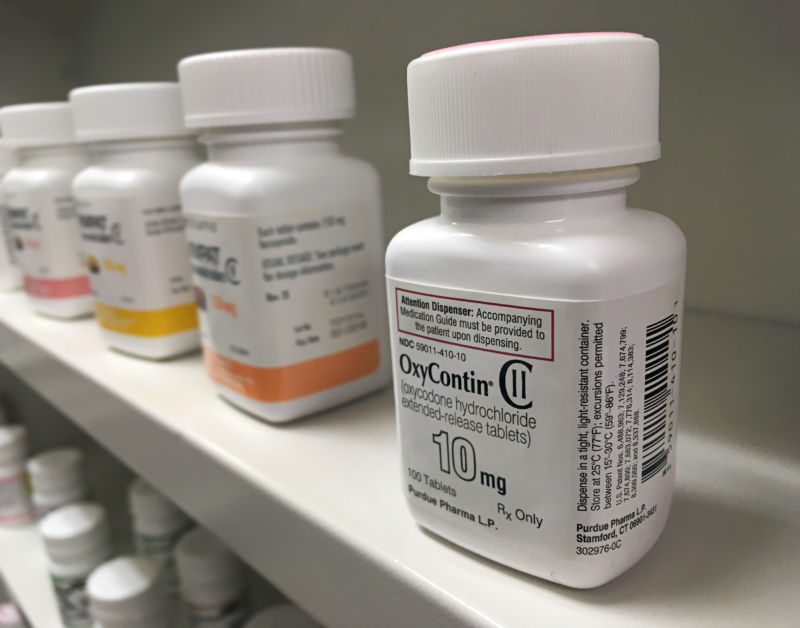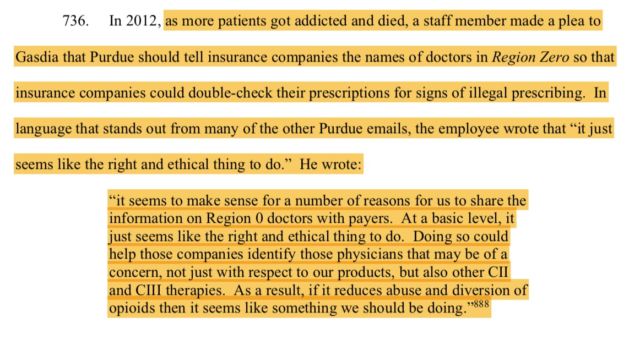
Earlier this month, Ars reported on a lawsuit filed by the Commonwealth of Massachusetts against OxyContin maker Purdue Pharma, members of its board, and the mega-rich, secretive family behind it all, the Sacklers. The court filings were the first to allege that the Sacklers—previously known mostly for their philanthropy—were in fact directly behind the aggressive tactics that Purdue used to drive sales of its highly addictive opioid pain killer, which allegedly helped to ignite the current opioid epidemic. Those same sales tactics were found to be deceptive and fraudulent by federal prosecutors in 2007.
Massachusetts’ allegations painted a grim image of greed and callousness on the part of the family—for example, Richard Sackler’s suggestion to consider patients who became addicted to their powerful drugs “reckless criminals” to protect sales and profits. But the version of the lawsuit released didn’t have the full picture. Parts of the nearly 300-page complaint were redacted at the request of Purdue and the Sacklers.
That’s not the case anymore. On Monday, January 28, a Massachusetts judge ruled that the lawsuit could be released in full, and the state’s attorney general’s office did so on Thursday. The newly revealed portions don’t dramatically change the loathsome portrait the allegations paint of the affluent family. However, there are some interesting new pieces of information, and Ars has gone ahead and plucked them out.
First, if you’re interested in perusing the unredacted version yourself, here is the full document (PDF) with the previously redacted sections highlighted in yellow. (For comparison, here is the previously redacted version.)
Here are some of the big pieces of information and allegations in the lawsuit that the Sacklers didn’t want you to see. (List is followed by a gallery, where, again, highlighting represents previously redacted text):
- The spoils of OxyContin allowed the Sacklers, as board members, to vote to pay themselves more than $4 billion between 2007 and 2018. Figures for individual payments during those years are sprinkled throughout the lawsuit.
- Members of the family personally ordered Purdue to increase the sales force on a number of occasions.
- The family was directly involved in pushing for higher—and more dangerous—doses of OxyContin.
- For years, the McKinsey & Company consulting firm had worked with Purdue to come up with sales tactics. According to a redacted section, the consultants “had reported to Purdue on opportunities to increase prescriptions by convincing doctors that opioids provide ‘freedom’ and ‘peace of mind’ and give patients ‘the best possible chance to live a full and active life.'”
- Board meetings for the US-based company were held in exotic and luxurious places, such as Bermuda and a castle in Ireland.
- Members of the Sackler family worked on a secret plan codenamed “Tango,” which would have expanded Purdue’s business into addiction-treatment drugs.
- Purdue employees actively tried to avoid the Sacklers because of their relentless and aggressive demands
- Richard Sackler allegedly sought revenge on an insurance company for dropping coverage of OxyContin amid the epidemic of abuse.
- The Sacklers allegedly knew about but did not report suspected cases of diversion and abuse by doctors.
-
The Sacklers paid themselves more than $4 billion.
-
The Sacklers ordered Purdue to hire more sales staff.
-
Sales staff jumped from 300 to 700.
-
The Sacklers pushed for stronger dosages.
-
McKinsey suggested pitching opioids as lifestyle drugs.
-
Exciting locations of their board meetings.
-
Region Zero tracked doctors suspected of diversion or abuse.
-
The Sacklers were demanding bosses.
-
Tactics were aimed at keeping people on opioids.
-
Pushing for more prescriptions.
-
And getting patients on higher doses.
-
Project Tango was a secret plan to get Purdue into addiction treatment drugs.
-
The Sacklers considered working to get people hooked, then unhooked.
-
Opioid drugs are addictive.
-
Suggested patient flow.
-
Last, a shout-out to the noble employee at Purdue who tried to right the ship, sending this email.

The employee left Purdue a month after writing this.
https://arstechnica.com/?p=1450395

